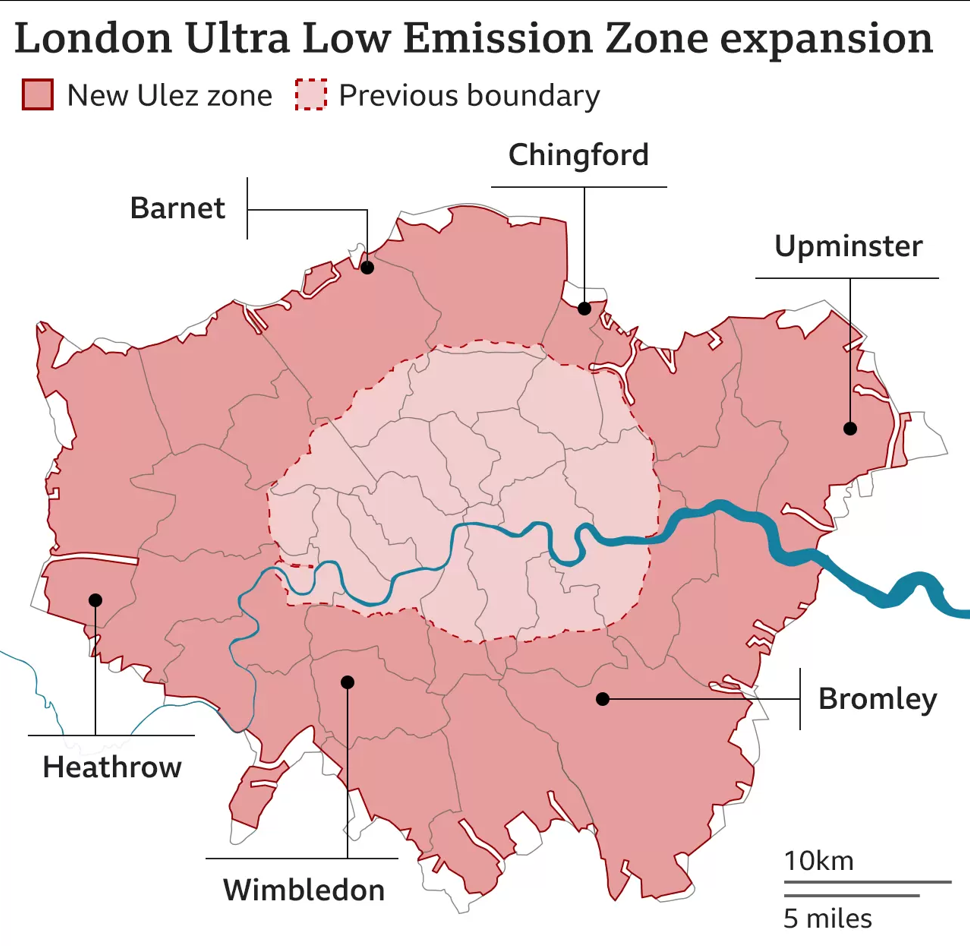In a significant move towards reducing air pollution and combatting climate change, the Ultra Low Emission Zone (ULEZ) in London has expanded to encompass all of the city’s boroughs. This expansion, which came into effect recently, is part of a broader clean-air plan aimed at improving air quality and reducing emissions in the UK’s capital. In this article, we’ll delve into the details of the ULEZ expansion, its impact on Londoners, and the broader implications for clean air initiatives.
Expanding the ULEZ
The ULEZ expansion means that drivers of non-compliant vehicles are now required to pay a daily charge of £12.50 when travelling within the designated zone. This controversial move is intended to incentivize the use of environmentally friendly vehicles and reduce harmful emissions. It’s worth noting that a £160 million scrappage scheme is still available for all Londoners, offering a maximum of £2,000 per vehicle. This scheme is inclusive of small businesses, sole traders, and charities, making it accessible to a wide range of residents.
Monitoring and Challenges
To enforce the ULEZ expansion effectively, Transport for London (TfL) has deployed a network of 2,750 cameras across outer London. As of mid-August, almost 70% of these cameras had been installed. However, this rollout has faced challenges, with the Metropolitan Police reporting hundreds of incidents of criminal damage to these cameras, including vandalism and theft. Despite these setbacks, TfL remains committed to enforcing the expansion.
TfL’s director of transport strategy and policy, Christina Calderato, has recommended that drivers sign up for an Auto Pay account on TfL’s website. This system automatically charges drivers, ensuring they never receive a penalty charge notice (PCN). Drivers of non-compliant vehicles must pay the £12.50 charge online or by phone within three days of traveling. Failure to do so results in a penalty of £180, which decreases to £90 if paid within 14 days.
Mixed Reactions Among Londoners
The ULEZ expansion has generated a mix of opinions among London residents. Some, like Steve Allen, express concerns about the cost of compliance and the implementation of the scheme. Mr. Allen’s wife, who owns a non-compliant vehicle, has chosen to pay the daily charge but finds fault with how TfL and local councils have managed the program.
In contrast, supporters like an anonymous woman in Bromley emphasize the importance of combating climate change and view the ULEZ expansion as a step in the right direction. She believes that it is part of a more comprehensive strategy to address environmental challenges*.
Political and Public Responses
The ULEZ expansion has not been without its share of political and public opposition. Prime Minister Rishi Sunak expressed concerns about the financial burden on working families, while members of Mayor Sadiq Khan’s own party were hesitant to support the policy. Additionally, Conservative councils challenged the policy in the High Court but ultimately lost the case.
Clean air activist Rosamund Adoo-Kissi-Debrah, whose daughter’s death was attributed to air pollution, supports the ULEZ expansion but also highlights the need for government contributions to the scrappage scheme to ensure it benefits lower-income families. The Conservative mayoral candidate Susan Hall has pledged to reverse the ULEZ expansion if elected in May 2024.
The expansion of the ULEZ in London is a bold step towards addressing air pollution and climate change. While it has faced opposition and challenges, it represents a commitment to creating a cleaner and more sustainable environment for all Londoners. As the ULEZ continues to evolve, its impact on air quality and emissions reduction will be closely monitored, and it will likely serve as a model for similar initiatives in other urban areas around the world.
Picture source: TFL
*Source: BBC London







